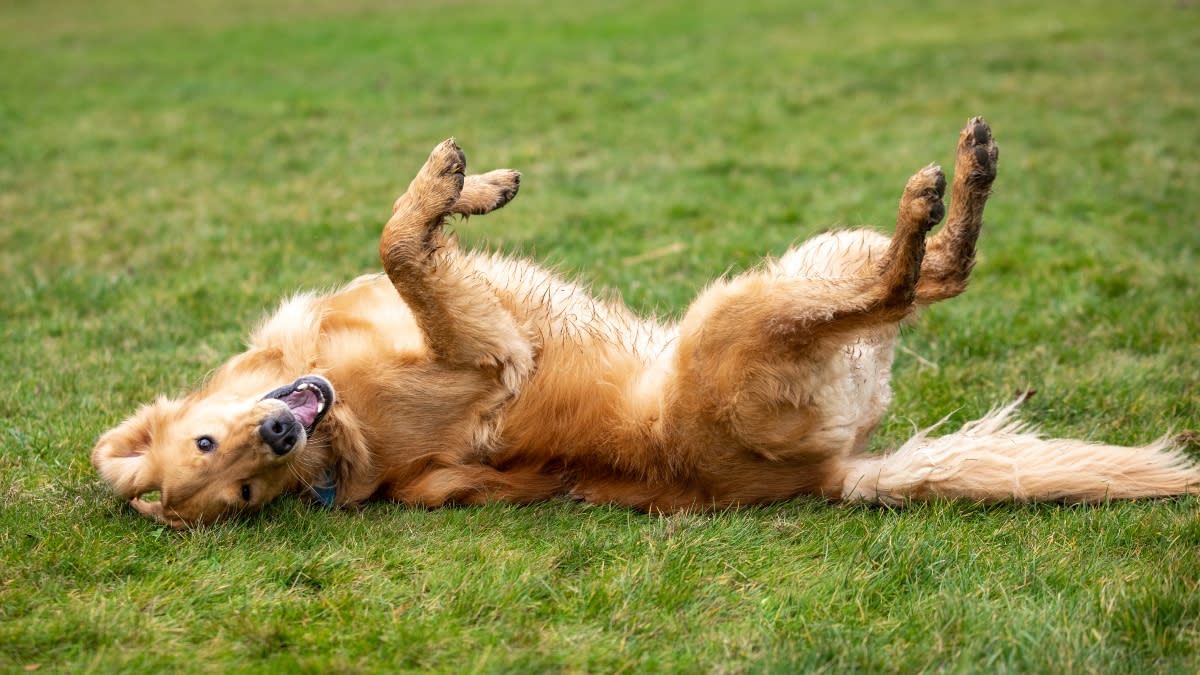Why Does My Dog Roll in Poop? (And Other Weird Things Fluffy Does on Instinct)

If you have a dog, you're probably constantly entertained. Whether they’re sitting on your feet, barking at their reflection, or falling asleep in bizarre positions that can’t possibly be comfortable, their quirky behaviors are part of their charm. There are, however, less charming habits, like rolling around in smelly garbage and digging holes in your garden, that range from bothersome to just plain odd. While seemingly random, these behaviors are instinctual — a manifestation of domesticated dogs' wild, wolfy roots. Read on to learn more about these instincts, and to understand why Fido keeps burying his favorite toys.
How did wolves become lapdogs, anyway?
If you have a husky or a German shepherd, it’s not hard to tell that your pup descended from wolves. But no matter how deeply you look into the eyes of your Shih Tzu or Maltese, their wild roots are more difficult to fathom. We don't know the exact details of how all breeds of domesticated dogs came to be, but Encyclopedia Britannica reports that over tens of thousands of years, humans trained and bred wild dogs to develop certain traits and make them companions, hunters, and protectors. As a result, there are now more than 400 distinct breeds, all descended from the gray wolf.
How did humans accomplish this feat? Likely, by offering the same thing you do to persuade your dog to behave — treats. Research in Scientific American posits that during the Ice Age, humans shared food scraps with wild dogs, which conditioned them to look at humans as benefactors instead of enemies, and may have begun the domestication process. So, next time Fluffy begs for your table scraps, just remember that she can’t help it; it’s in her DNA.
Weird Things Your Dog Does On Instinct
What other things does your dog do based on their wild instincts? As it turns out, a lot. Some of your dog’s weirdest quirks, like choosing to sleep right next to the expensive bed you bought them instead of in it, or being afraid of lettuce (like this dog), are inexplicable. Like humans, dogs have their own unique personalities. Some behaviors might be breed-specific, too: For example, your herding dog may nip at heels and round up your family, and your Labrador Retriever may bring you random items from around the house for fun. Below are three common pup behaviors and the explanations for them. They're proof that you can take the dog out of the wilderness, but you can’t take the wilderness out of the dog.
Turning in Circles Before Lying Down
Watching your dog perform sleepy rotations before snuggling in for the night is an adorable, albeit confusing sight, and one of several inherited behaviors. OneGreenPlanet says that because dogs’ wild ancestors didn’t have fluffy beds or blankets to cuddle up on, they would spin in place to pat down grass and clear away debris for a comfy napping nest. Other sources note that this circling was a way to properly survey their surroundings before letting their guards down to rest. Keep in mind that if your dog is circling excessively before resting, or is having trouble getting settled, it may be a sign that they’re experiencing back or joint discomfort, and you should contact your vet.
Digging Holes
Knowing the holes in your freshly planted garden were dug because of your dog's primal instincts doesn’t make them any less frustrating. Though terriers — who were bred to hunt small animals like rabbits — are common culprits of this behavior, many dogs engage in digging because of things they smell underground, according to Veterinarians.org. It’s an instinctual hunting behavior inherited from ancestors. Digging holes also enables dogs to bury treasured items, like toys or treats, to “protect” them from being stolen. Wild dogs would even bury extra food underground to keep it safe and fresh, says pet blog Ollie.
Rolling in Stinky Stuff
You’re taking your dog for a nice walk in a riverside park when, all of the sudden, she drops to the ground to roll on top of a dead fish, smearing its odor all over her body. Yuck. But your pup doesn’t do this to make the ride home miserable — rather, they're putting the “stink” in “instinct” and acting on ancestral urges. To mask their scent from unsuspecting prey while hunting, wild dogs would cover themselves in strong smells. If only they’d roll in a flower bed instead.
Dogs are fascinating animals. Though it’s been thousands of years, they still perform the same behaviors as their wild ancestors. Who knows how dogs will behave in another thousand years? With all the pampering they get now, they'll probably demand five-star meals instead of settling for scraps. (And honestly, they do deserve the best.)
This article originally appeared on our sister site, First for Women.

